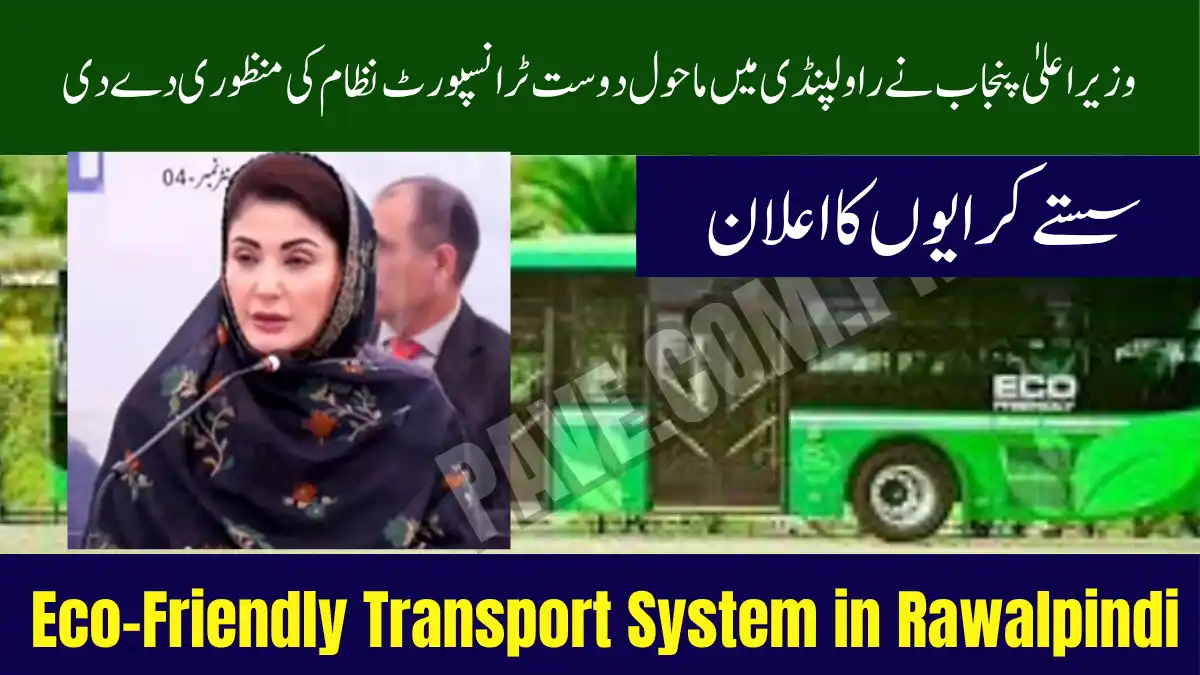Punjab CM Approves Eco-Friendly Transport System in Rawalpindi — Affordable Fare Announced
Punjab Chief Minister Maryam Nawaz has officially launched an ambitious new initiative to transform public transport in Rawalpindi — a modern, eco-friendly electric bus service designed to offer citizens a cleaner, cheaper, and smarter way to travel.
The project, titled the Punjab CM Approves Eco-Friendly Transport System in Rawalpindi, marks a major milestone in the provincial government’s push toward sustainable and affordable urban mobility. It’s part of a larger vision to reduce pollution, modernize infrastructure, and improve quality of life for millions across Punjab.
A Landmark Step Toward Green and Affordable Transport
Speaking at the launch event, Chief Minister Maryam Nawaz described the Punjab eco-friendly transport Rawalpindi project as a “revolutionary step toward a cleaner and more connected Punjab.”
The initiative introduces a fleet of 87 fully air-conditioned electric buses, imported in collaboration with Chinese partners, which will begin operating across key routes in Rawalpindi in the coming weeks.
To make the service accessible to everyone, the provincial government has set an affordable flat fare of just Rs. 20 per ride. In a compassionate gesture, senior citizens above 60 years of age will travel completely free of cost — a move that has been widely praised by the public.
What Makes This Project Different
Unlike traditional transport schemes, the Punjab CM transport project 2025 is built on three core principles: affordability, sustainability, and digital innovation.
- Affordable for Everyone: With a flat Rs. 20 fare, the system ensures that daily commuters — students, laborers, and office workers — can travel economically.
- Environmentally Friendly: The introduction of electric buses aims to reduce noise, carbon emissions, and dependency on fossil fuels.
- Technologically Advanced: The buses are equipped with GPS tracking, high-speed Wi-Fi, CCTV cameras, and USB charging ports — a first for any public transport system in Rawalpindi.
Officials say these innovations will not only enhance passenger comfort but also help authorities monitor efficiency and security in real time.
Green Buses Arrive in Rawalpindi
In the first phase, 87 brand-new electric buses have already arrived in Rawalpindi. These buses are part of the Rawalpindi green bus service, a subcomponent of Punjab’s wider Green Mobility Framework.
Each bus is fully electric, air-conditioned, and designed with low floors for easy access — making it friendly for the elderly and differently-abled passengers.
Construction is also underway for a dedicated electric bus terminal at the old GTS depot near Saddar, which will serve as the operational hub for maintenance, charging, and scheduling. This terminal will include solar-powered charging stations and a smart control room for route management.
Read More: Rawalpindi Welcomes New 45 Electric Buses
Routes and Coverage
The sustainable transport Punjab project will initially cover four major routes, spanning a total distance of nearly 84 kilometers across Rawalpindi. These routes will connect residential zones, business districts, and key city entry points, ensuring maximum accessibility for daily commuters.
Phase 1 Key Routes:
- Rawat to Motorway Chowk — connecting southern suburbs with central city corridors.
- Saddar to Adiala Road — serving high-traffic residential areas.
- Faizabad to Sixth Road and Committee Chowk — linking commuters to educational and business hubs.
- Bahria Town to Peshawar Road — catering to the expanding population in the city’s outskirts.
Bus stops along these routes are being upgraded with modern shelters, passenger seating, route displays, and solar lighting. The government has also planned to install digital information screens showing live arrival and departure updates.
Comfort Meets Technology
Each bus in the Punjab CM transport project 2025 is equipped with state-of-the-art facilities that make commuting both safe and comfortable. Passengers will have access to:
- Free Wi-Fi for internet connectivity
- GPS-based real-time tracking via mobile app (to be launched soon)
- USB mobile charging ports at every seat
- CCTV cameras for passenger safety
- Voice announcements and digital displays for next stops
With these upgrades, the Punjab eco-friendly transport Rawalpindi network brings international-level standards to local commuters — combining comfort with sustainability.
Focus on Environmental Impact
The launch of this initiative is a major stride in reducing Rawalpindi’s urban pollution. The city, like many in Punjab, struggles with rising smog and vehicle emissions. The Punjab CM Approves Eco-Friendly Transport System in Rawalpindi initiative aims to directly address that issue by cutting down on thousands of liters of diesel consumption each day.
Experts estimate that the switch to electric buses will lower the city’s carbon footprint by over 30 percent once the fleet becomes fully operational. This also contributes to Punjab’s climate commitments and supports Pakistan’s broader Clean and Green Vision 2030.
Chief Minister Maryam Nawaz emphasized that “the goal is not only to move people efficiently but to protect the environment for future generations.”
Creating Local Jobs and Technical Skills
Beyond environmental benefits, the Rawalpindi green bus service is also generating hundreds of new local jobs. From drivers and maintenance technicians to IT engineers and operations staff, the project is opening new employment avenues for skilled and semi-skilled workers.
Additionally, the Punjab government has announced plans to launch a technical training program for electric vehicle mechanics, aimed at developing specialized skills among youth. This step aligns with the province’s mission to empower local talent and reduce dependence on imported expertise.
Officials confirm that several vocational institutes in Rawalpindi and Lahore will begin offering short-term EV maintenance courses by early 2026.
Free Travel for Senior Citizens: A Social Inclusion Step
One of the most celebrated aspects of the new policy is the free travel facility for senior citizens. The Punjab government has made it clear that people aged 60 and above will be able to commute across the city completely free of cost.
This decision, part of the Maryam Nawaz transport initiative 2025, is intended to support elderly citizens, reduce their mobility challenges, and ensure equitable access to public resources. Many senior citizens in Rawalpindi have welcomed the move, calling it a “dignified and thoughtful reform.”
Public Reception: Enthusiasm and Hope
Since the announcement, public response has been overwhelmingly positive. Social media users have praised the initiative for being “a long-overdue modernization” of Punjab’s transport infrastructure.
Daily commuters have described the affordable public transport Rawalpindi scheme as a “lifeline” that will significantly reduce travel expenses at a time when fuel costs continue to rise.
Commuters also expressed appreciation for the environmental aspect, saying they look forward to cleaner air and quieter streets once the electric buses replace diesel-powered wagons and vans.
Broader Vision: Toward a Sustainable Punjab
The sustainable transport Punjab strategy doesn’t end with Rawalpindi. According to government sources, the project will soon be replicated in Lahore, Multan, Faisalabad, and Sialkot, turning Punjab into Pakistan’s first province with a fully integrated electric public transport system.
This long-term plan includes:
- Expanding the fleet to over 500 electric buses by 2027.
- Introducing smart ticketing systems integrated with mobile apps and contactless payments.
- Developing solar-powered charging depots across major cities.
- Partnering with local manufacturers to assemble electric buses in Pakistan to reduce import dependency.
Chief Minister Maryam Nawaz has positioned this program as a flagship component of her green governance agenda, emphasizing that sustainable mobility is essential for inclusive economic growth.
Linking Modern Transport to Economic Growth
Economists believe the Punjab CM Approves Eco-Friendly Transport System in Rawalpindi initiative will have a ripple effect on the economy. Affordable and reliable public transport reduces travel time, cuts personal fuel expenses, and improves workforce productivity.
It also promotes small businesses by improving connectivity between commercial and residential areas. For Rawalpindi — a city of nearly three million residents — such infrastructure can significantly boost local trade and tourism.
The project is expected to encourage female workforce participation, as safer and cleaner transport options become more accessible. This aligns with the provincial government’s ongoing gender inclusion initiatives.
read More: Faisalabad Electric Bus Service October 2025
Looking Ahead: From Pilot to Province-Wide Expansion
Officials confirm that the first phase of operations will serve as a pilot model. Data collected from passenger feedback, route usage, and system performance will help refine the framework before scaling it across Punjab.
Future expansions will focus on:
- AI-based route optimization to manage traffic flow.
- Integration with intercity bus and train networks for seamless travel.
- Hybrid ticketing combining metro and bus cards into a single digital system.
If successful, this model could set the benchmark for modern transport across Pakistan.
Conclusion: A Greener Future on the Move
The Punjab CM Approves Eco-Friendly Transport System in Rawalpindi is more than a transport project — it’s a vision for the future.
By merging affordability, sustainability, and innovation, Chief Minister Maryam Nawaz has taken a bold step toward redefining public transport in Pakistan. With just Rs. 20 per ride, free travel for seniors, and cutting-edge technology at passengers’ fingertips, the initiative sets a new national standard for smart, inclusive, and environment-friendly mobility.
As buses begin to roll out across Rawalpindi, the project stands as a symbol of progress — proof that clean transport isn’t just possible but practical, affordable, and transformative. For the people of Punjab, this is not just the start of a new route — it’s the start of a new era.







